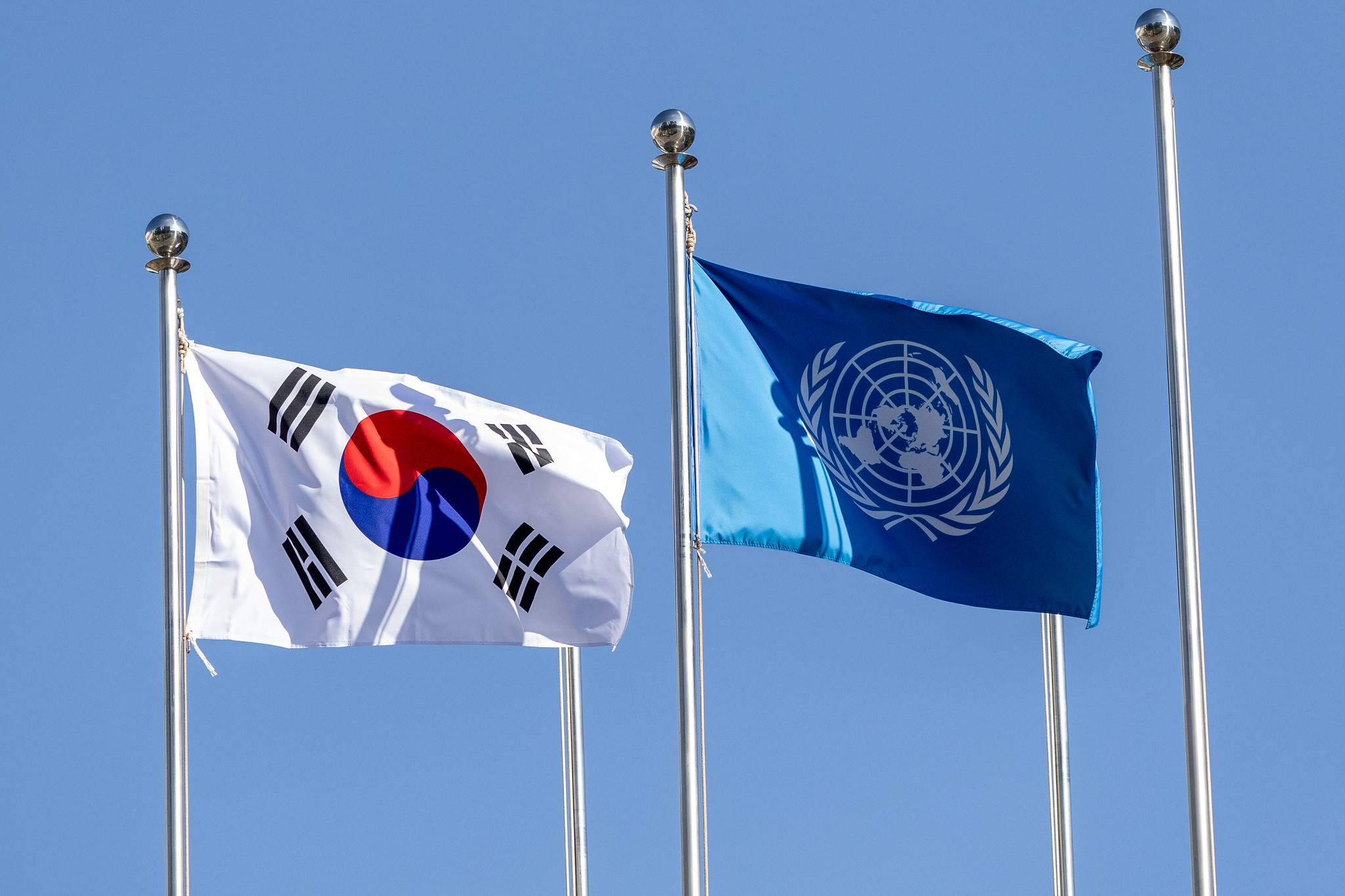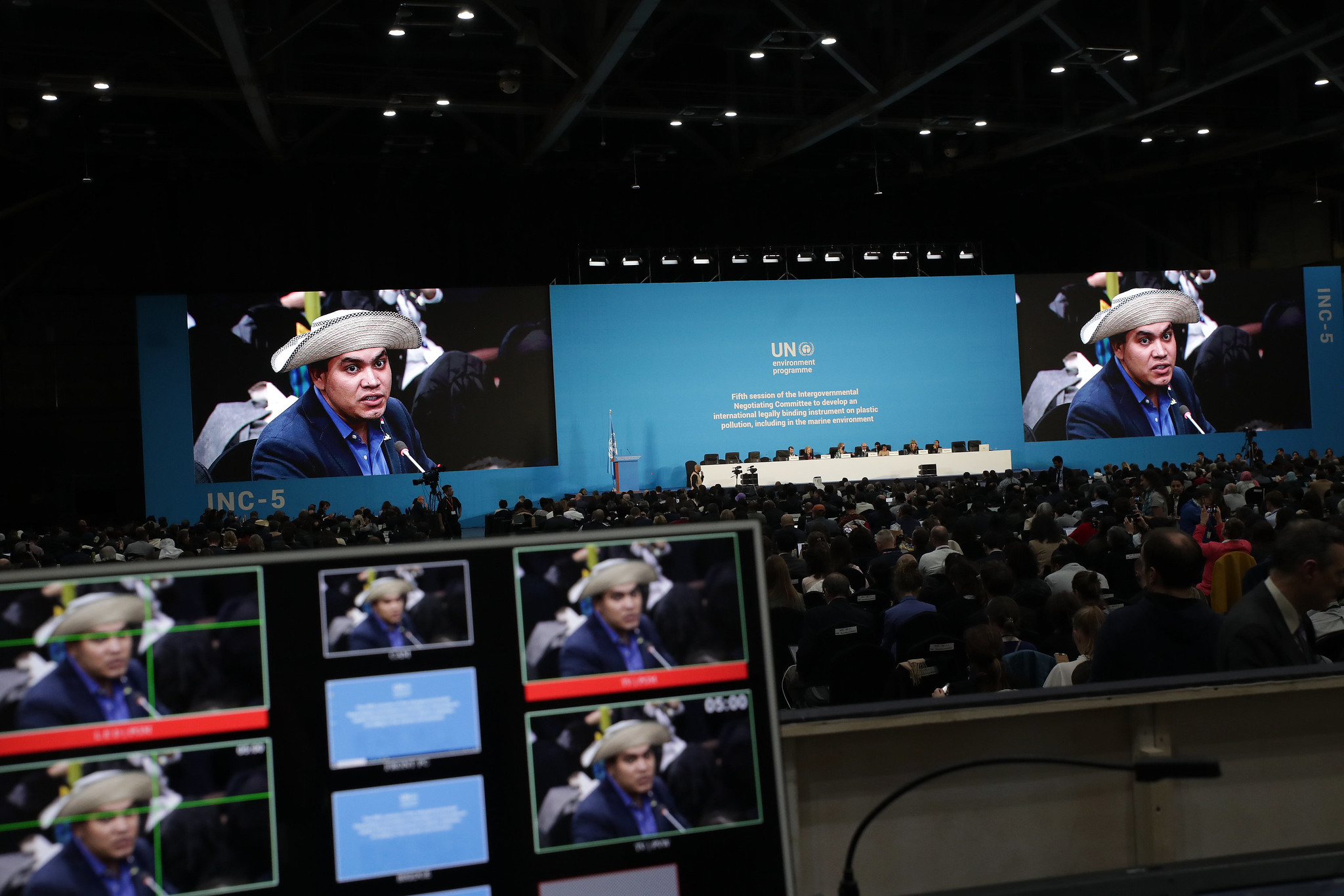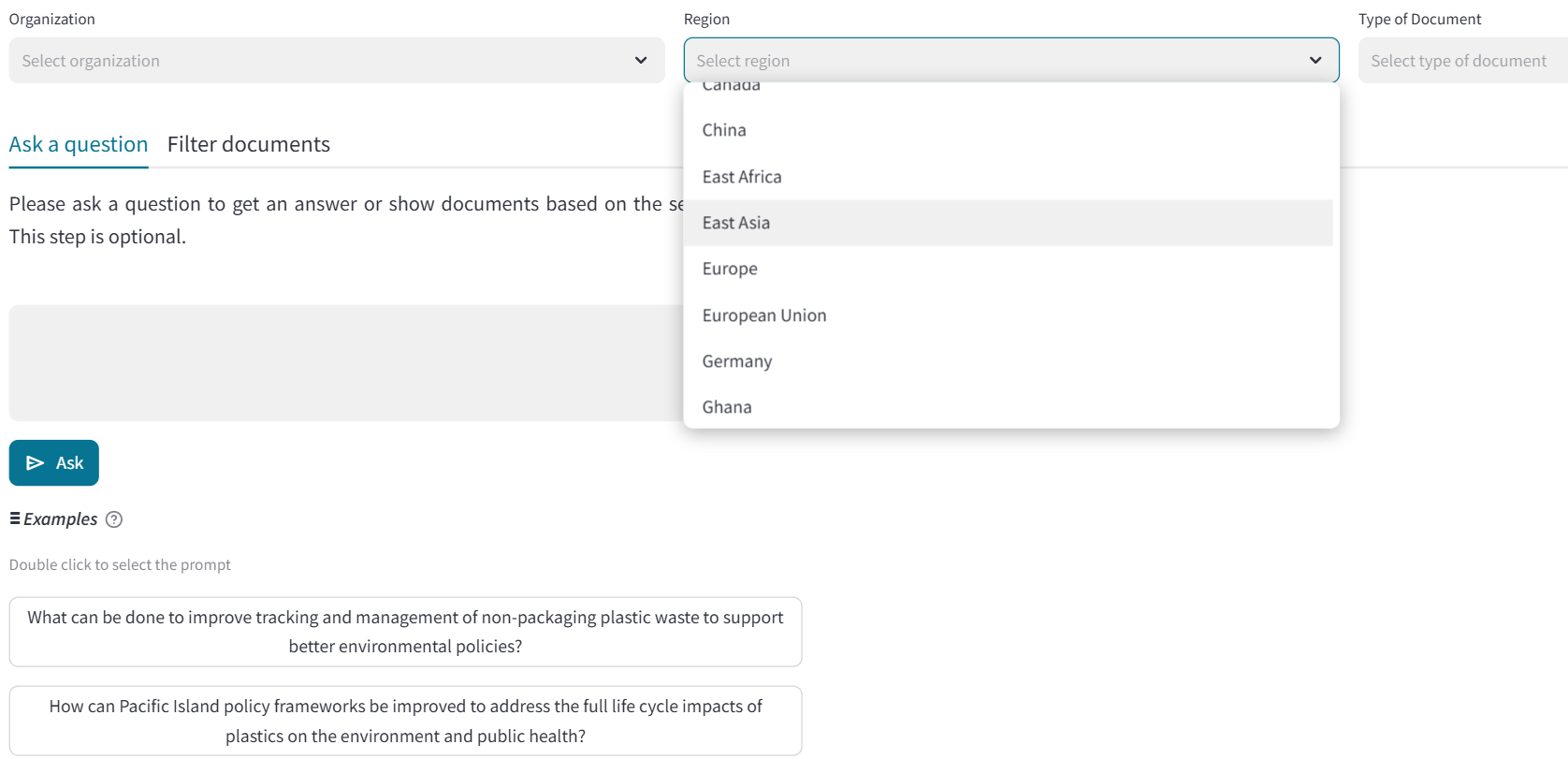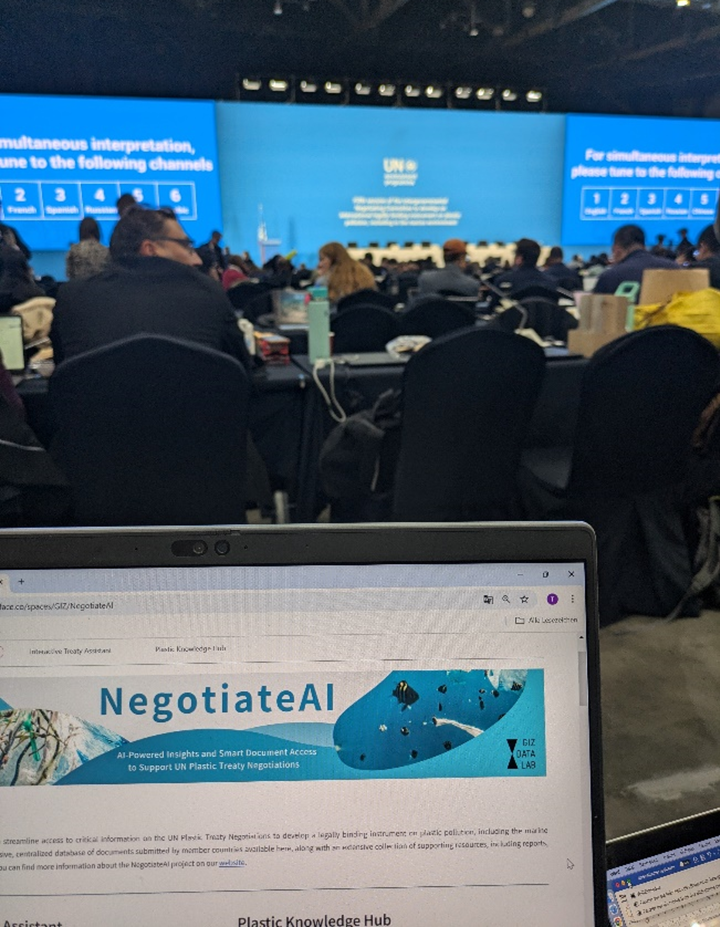NegotiateAI: Reflections on Recent Plastic Treaty Negotiations, Progress, and Empowering Smaller Delegations in Global Negotiations
January 16, 2025
Robin Nowok, Teresa Kroesen, Nadia Manasfi, Steffen Blume

Introduction
Since our initial blog post on NegotiateAI in June 2024, we have made significant steps in both the app's development and its application within international negotiations. Notably, we have introduced a brand-new frontend design, added key features, and broadened the app's use cases to enhance scalability. Concurrently, the UN-led Plastics Treaty negotiation process has faced particular challenges during the fifth negotiation session (INC-5) in Busan, Republic of Korea.
We had the opportunity to promote NegotiateAI on site at INC-5, where the app demonstrated its capability to assist negotiators and other stakeholders in semantically analyzing documents from the UNEP negotiation database. Users can input natural language queries into a free text box, and the app provides comprehensive, evidence-based answers with references to the underlying documents. For more details on the initial use case, please refer to our previous blog article.

Challenges in Reaching an Agreement
INC-5 was anticipated to be the final negotiation session to resolve outstanding issues and reach an agreement. However, the session was adjourned without establishing a legally binding treaty to end plastic pollution, primarily due to unresolved objections and divergent positions on key topics.
One major point of contention was the proposal for plastic production caps. The High Ambition Coalition to End Plastic Pollution (HAC), comprising over 100 countries – including EU member states, the UK, Canada, and several African, Latin American, and Pacific nations – advocated for legally binding measures to reduce plastic production and phase out certain harmful plastic products and chemicals found therein. In contrast, major oil and plastic-producing countries, notably Saudi Arabia, Russia, Iran or India, opposed production caps, favoring waste management solutions instead.
Disagreements also persisted regarding chemical regulations. The HAC and supporting nations pushed for global bans on certain hazardous chemicals used in plastics, emphasizing the need to protect human health and the environment. Opposing countries with support from the strong chemical industry lobby present at INC-5, such as the American Chemistry Council, argued against such bans, suggesting a focus on addressing mismanaged waste instead.
Procedural challenges further complicated the negotiations. Delays and a lack of consensus on decision-making processes, coupled with the significant presence of industry lobbyists, reportedly outnumbering some national delegations, added complexity to the discussions. As a result, the session was adjourned without a finalized treaty, with plans to resume negotiations in 2025. This delay underscores the complexities involved in achieving a global consensus on measures to effectively address the escalating plastic pollution crisis.

Further readings:
- Reuters: https://www.reuters.com/business/environment/over-100-countries-back-plastic-treaty-caps-talks-reach-fierce-finish-2024-11-30/?utm_source=chatgpt.com
- Financial Times: https://www.ft.com/content/737b609d-d660-4f91-a016-740d9c476642?utm_source=chatgpt.com
- AP News: https://apnews.com/article/plastic-pollution-treaty-south-korea-75187319a8cebc6e54fc1557ff40b266
Advancements in NegotiateAI
Since its initial deployment during the 4th session of the Intergovernmental Negotiating Committee (INC-4), NegotiateAI has undergone significant enhancements based on valuable user feedback. These improvements include fundamental changes to its technical design and the introduction of the Plastic Knowledge Hub, This hub provides users with a comprehensive resource collection for research, fact-gathering, and in-depth exploration of key topics related to plastic pollution. To provide further clarity, both the Plastic Knowledge Hub and the Treaty Assistant now share similar and advanced functionalities, including semantic search and database filtering, ensuring a cohesive and efficient user experience across both features.
Once again, in collaboration with the BMUV-funded Support Project on Marine Litter Prevention, we have curated a database of 193 scientific publications, publicly accessible studies, technical reports, and other materials, searchable through a Retrieval Augmented Generation (RAG) system. Users can pose context-specific or open-ended questions via a free-text input, which enables inquiries beyond the official treaty submissions. For instance, users might ask, “What measures can enhance tracking and management of non-packaging plastic waste for improved policies?” or “How effective are industry-proposed solutions like recycling and incineration in addressing the plastic crisis?”. The AI tool references up to eight documents per query and provides links to the complete set of relevant materials for further exploration. If no satisfactory answer exists, the bot transparently indicates this, ensuring reliability without generating unsupported responses. The database spans publications from 2017 to 2024 (most from 2023) authored by organizations like UNEP, CIEL, UN-Habitat, GAIA, WWF, and Greenpeace, among others.

Beyond content improvements, the user interface has been redesigned into a modern style for a more intuitive, efficient, and visually appealing experience. A new "Home" tab anchors users to the site, offering an overview of project objectives, partners, and technical details, aligning with the open-source nature of NegotiateAI and all of our GIZ Data Lab prototypes. On the home screen, interactive data-analytical insights provide a dynamic view of the negotiation database. Features include:
- Interactive world map visualizations showing submissions per country over the timeline of INC rounds (1-4, incorporation of INC-5 data still pending).
- A frequency keyword analysis, graphically displaying the five most commonly mentioned words per document in a word histogram.
These enhancements make NegotiateAI a more intuitive, powerful and flexible tool for supporting negotiations and fostering informed decision-making in the fight against plastic pollution as well as serving as a transparent and easily accessible tool for all interested individuals around the plastic treaty negotiation process.

Technical Changelog Summary
In the transition from INC4 to INC5, we upgraded the backend from Haystack 1.2 to Haystack 2.0 and replaced the in-memory document store with a Qdrant vector database, greatly enhancing scalability and performance. We also added more recent submissions and established a new knowledge hub for comprehensive research support. On the front-end, we revamped the landing page and introduced two feature pages, delivering a more intuitive user experience with new visualizations like maps and keyword analytics.
|
Change |
Description |
Reason |
Advantages |
|
Haystack Upgrade |
Upgraded from Haystack 1.2 to Haystack 2.0 |
The previous version lacked certain features and had performance constraints, necessitating a more robust and modern framework for data processing |
More efficient and reliable data processing, as well as access to the latest functionalities offered by Haystack |
| Database Migration |
Transitioned from an in-memory document store to a Qdrant vector database |
While in-memory document stores can handle smaller datasets effectively, they become resource-intensive and impractical for large-scale data because all information must reside in RAM and did not support vector-based semantic search for larger datasets. Specialized vector databases (e.g., Qdrant) are designed to handle significantly larger datasets and offer more robust performance. |
Enhanced scalability, and faster query handling |
| Database Enhancement |
Added more recent submissions for the “treaty assistant” and introduced a new database for the “knowledge hub” |
The treaty assistant required up-to-date submissions to remain relevant, and an additional database was needed to manage specialized knowledge hub resources |
Comprehensive coverage for the treaty assistant, a dedicated knowledge hub for specialized research, and a streamlined user experience |
|
Front-End Adaptation |
Revised the landing page layout and introduced two feature pages |
The existing single-page layout could not accommodate new features, highlighting the need for improved navigation and dedicated sections |
An enhanced user experience, clearer information flow, and better usability through distinct feature pages |
|
New Visualizations |
Added map views and keyword-based visual elements |
Users required more intuitive and interactive methods for exploring data beyond basic text-based displays |
Deeper insights through interactive maps, a more engaging interface, and simplified interpretation of complex data |
Observations and Outlook
We are encouraged by the positive feedback and are committed to further enhancing NegotiateAI for the resumed negotiation session (INC-5.2). Developing an app might be comparable to producing a piece of music – it's never truly complete, as there's always room for (technical) improvements and new features. During INC-4, we observed that while the app's database of documents from previous negotiation rounds was valuable for policy advisors' preparation and analysis, real-time access to newly submitted documents was crucial during the negotiations. However, incorporating these documents promptly was challenging due to manual data entry and variations in the official database's structure between rounds (INC 4 and INC 5 website design looked different and had various changes in categories including meta data categorization). To mitigate such unforeseen challenges, we are currently exploring the option of allowing users to independently upload content during the negotiation span. This could either be done temporarily to preserve the quality of the curated database or by designating a responsible individual to review the uploads and decide whether to approve or reject their inclusion into the database.
!!! We welcome any ideas or suggestions for improvements or new features. Please feel free to contact us; we appreciate all feedback !!!
Beyond the plastic treaty negotiations, we have identified several scaling opportunities. Together with the data (innovation) labs of the German Federal Foreign Office and the Ministry for Economic Cooperation and Development, we are exploring the development a negotiation solution for future climate negotiations, aiming to create a Digital Public Good (DPG). Furthermore, again with the Data Innovation Lab of the German Federal Foreign Office, and GIZ colleagues from Ethiopia, we are brainstorming possibilities for an application of an AI-supported policy tool. The goal is to provide a foundation for the development of similar apps tailored to the needs of the African Union in the future.
We are especially thrilled that what began as a small, initial idea has now generated such significant attention and momentum. While we are excited about the expansions and scaling activities, our primary focus remains: Empowering smaller delegations in the negotiations for a globally binding treaty to combat plastic pollution. Our aim is to ensure that these delegations are not only heard but also play a pivotal role in shaping compromises and contributing to decision-making processes on equal footing. With NegotiateAI, we are confident that 2025 will bring further progress toward this core mission.
